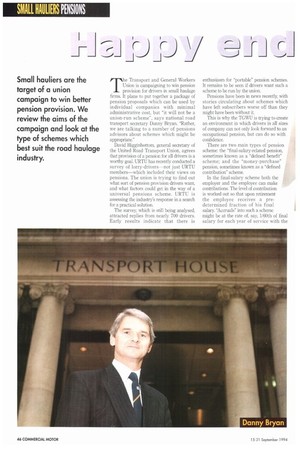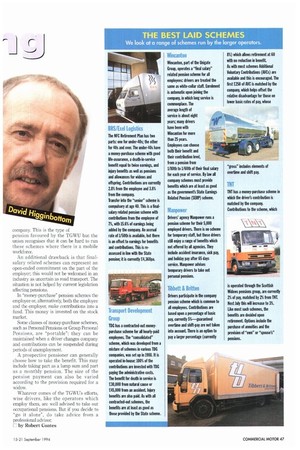T he Transport and General Workers Union is campaigning to win
Page 48

Page 49

If you've noticed an error in this article please click here to report it so we can fix it.
pension provision for drivers in small haulage firms. It plans to put together a package of pension proposals which can be used by individual companies with minimal administrative cost, but "it will not be a union-run scheme", says national road transport secretary Danny Bryan. "Rather, we are talking to a number of pensions advisors about schemes which might be appropriate."
David Higginbottom, general secretary of the United Road Transport Union, agrees that provision of a pension for all drivers is a worthy goal. URTU has recently conducted a survey of lorry-drivers---not just URTU members—which included their views on pensions. The union is trying to find out what sort of pension provision drivers want, and what factors could get in the way of a universal pensions scheme. URTU is assessing the industry's response in a search for a practical solution.
The survey, which is still being analysed, attracted replies from nearly 700 drivers. Early results indicate that there is enthusiasm for "portable" pension schemes. It remains to be seen if drivers want such a scheme to be run by the union.
Pensions have been in news recently, with stories circulating about schemes which have left subscribers worse off than they might have been without it.
This is why the TGWU is trying to create an environment in which drivers in all sizes of company can not only look forward to an occupational pension, but can do so with confidence.
There are two main types of pension scheme: the "final.salary-related pension, sometimes known as a "defined benefit" scheme; and the "money-purchase" pension, sometimes known as a "defined contribution" scheme.
In the final-salary scheme both the employer and the employee can make contributions. The level of contribution is worked out so that upon retirement the employee receives a predetermined fraction of his final salary "Accruals" into such a scheme might be at the rate of, say 1/60th of final salary for each year of service with the company, This is the type of pension favoured by the TGWU but the union recognises that it can be hard to run these schemes where there is a mobile workforce.
An additional drawback is that finalsalary related schemes can represent an open-ended commitment on the part of the employer; this would not be welcomed in an industry as uncertain as road transport. The situation is not helped by current legislation affecting pensions.
In "money-purchase" pension schemes the employee or, alternatively, both the employee and the employer, make contributions into a fund. This money is invested on the stock market.
Some classes of money-purchase schemes, such as Personal Pensions or Group Persona' Pensions, are "portable": they can be maintained when a driver changes company and contributions can be suspended during periods of unemployment.
A prospective pensioner can generally choose how to take the benefit. This may include taking part as a lump sum and part as a monthly pension. The size of the pension payment can also be varied according to the provision required for a widow.
Whatever comes of the TGWU's efforts, wise drivers, like the operators which employ them, are well advised to take out occupational pensions. But if you decide to "go it alone", do take advice from a professional advisor,
































































































